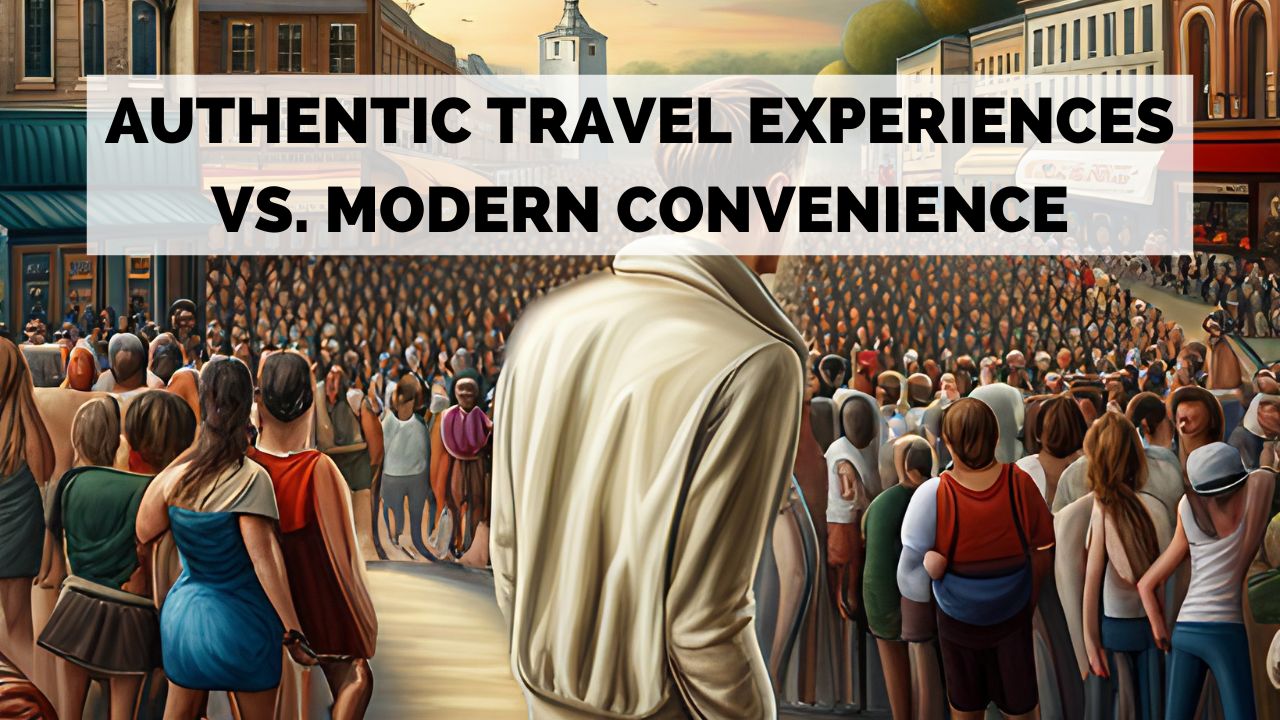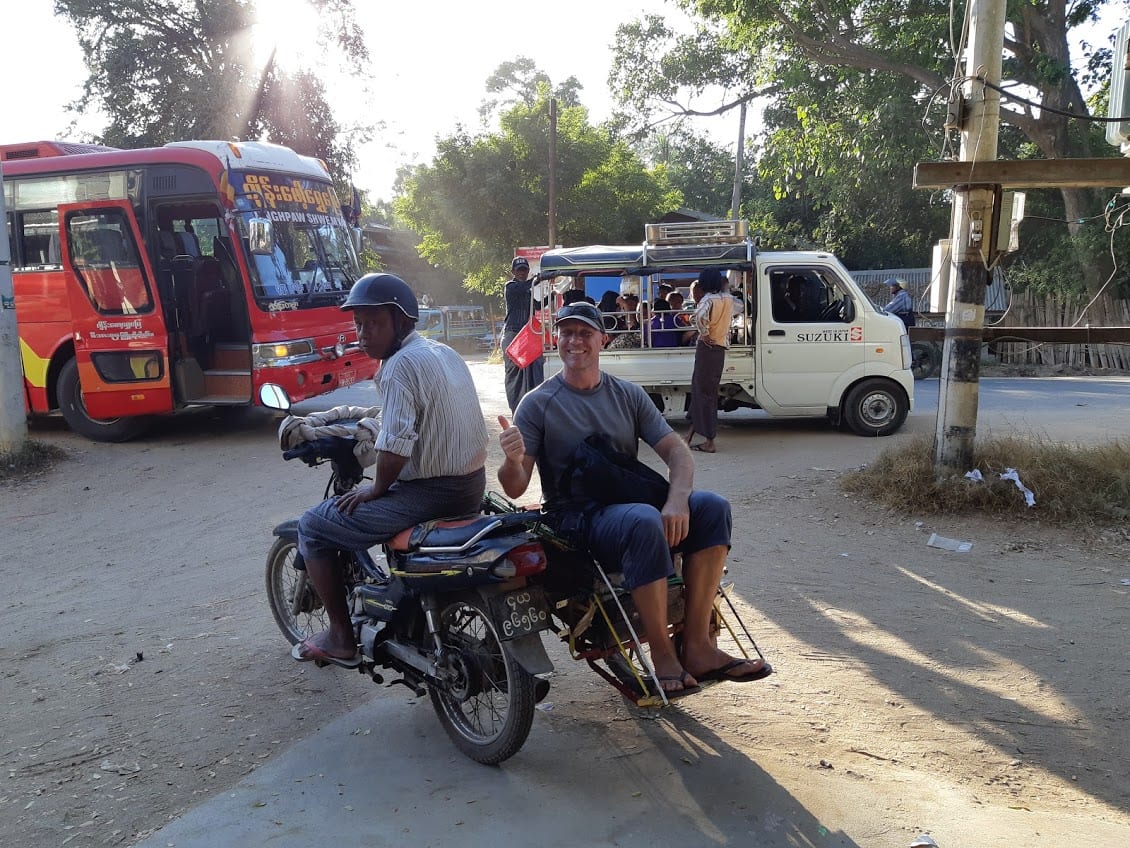Has new technology made travel easier but less authentic? Perhaps it's time to pause and reflect before your next trip.

Authentic travel experiences allow visitors to connect deeply with new cultures and destinations, going beyond the tourist hotspots for a more genuine and immersive journey. By interacting with local communities, sampling traditional foods, and participating in unique activities, travelers gain a deeper understanding of the people and places they encounter.
Authentic local experiences are not just about taking beautiful photos or collecting souvenirs; they provide lasting memories and enrich our lives by broadening our horizons and fostering empathy towards other cultures.
How do we travel today?
Authentic travel experiences involve taking things at a slower pace and immersing oneself in local cultures, trying local foods, and seeking out more “real” experiences.
These types of experiences have become increasingly popular among younger generations and long-term travelers who are looking for more meaningful and fulfilling travel experiences.
However, modern convenience can sometimes get in the way of truly experiencing a destination.
With the rise of online booking platforms and travel review websites, it's easier than ever to plan and book a trip online.
It offers a ‘plug and play' lifestyle, particularly to digital nomads where it can have benefits. The downside, is there is a tendency to live in a bubble, and miss out on authentic experiences in different countries around the world.
Exploring a destination without pre-planning or relying too heavily on technology can lead to all sorts of adventures and understandings.

The Rise of Authentic Travel (Or Back to Basics)
Travelers are increasingly seeking out more authentic travel experiences because they want to immerse themselves in local cultures, try local foods, and have unique experiences that are not available in their home countries. This is more or less how I started traveling 30 odd years ago, so it's good to see things go full circle!
These types of experiences are often seen as more meaningful and fulfilling than simply checking off tourist attractions because they allow travelers to connect with the local people and gain a deeper understanding of the destination's history, customs, and way of life.
By immersing oneself in the local culture, travelers can learn about different ways of living, broaden their perspective, and gain a new appreciation for the diversity of the world.
Trying local foods is another way to experience a new culture and can be an exciting adventure for foodies. Additionally, unique experiences such as attending a local festival, visiting a traditional market, or participating in a cultural activity can provide travelers with memories that last a lifetime.
In contrast, simply visiting tourist attractions can sometimes feel superficial and disconnected from the reality of a destination.
It can also lead to overcrowding and commercialization of the site, which may take away from the experience (I'm looking at you, Santorini). Social media can sometimes create unrealistic expectations of travel destinations or lead people to prioritize taking the perfect photo over actually enjoying the experience..
Therefore, many travelers are now seeking out authentic experiences that allow them to truly connect with a destination and create meaningful memories.

The Drawbacks of Modern Convenience
In today's world of modern technology, booking trips and accommodations online has become the norm. The world is literally at our finger tips. It's easy to research a destination and find the best deals on flights, hotels, and experiences.
However, while these resources can make travel more convenient, they also come with a downside: they can sometimes lead to missing out on special experiences.
For example, many people looking to experience Greece want to combine Athens, Mykonos and Santorini because these are the destinations they have heard about. Few people realise that Greece has 120 inhabited islands, all of which are a lot more laid back and authentic than Santorini and Mykonos!
So why is it, with the world at our finger tips, we all end up at the same places, adding to the crowds, and feeding the tourist conveyor belt?
Narrow focus (using a telescope to read a map)
One of the main problems with relying on ‘top 10 things to do in' google searches, and online booking is that they often provide a limited view of a destination.
They tend to focus on the most popular destinations, attractions, restaurants, and hotels – that by definition are popular because they are in a perpetual flywheel feedback loop. The more people go there, the more people there are to talk about it, and so on.
And I'm guilty as charged for contributing to this. People want to go to Santorini, Mykonos and Paros, and so I have to provide information for them (because, you know, bills to pay!).
This leaves me at a loss for writing about somewhere like Sikinos. On the one hand, this is the real authentic Greece, but on the other, I don't want too many people to find out about it either!

Related: Where to travel in Greece
My definition of when a destination has ‘lost it'
Since living in Greece for the last eight years, I can see a clear difference between islands ruined by tourism and those that haven't – yet. My definition of when a place is ruined, is when there is one or more fish spa treatment places. Again, I'm looking at you Santorni and Mykonos!
So, I do my best to show people how to have the best experience in the more well-known destinations. They can be enjoyable, but often lack the authenticity and personal touch that can make a trip truly special. Depending on people's expectations, of course.
I also write about the smaller, more genuine destinations, but the truth is, the majority of people planning a once in a lifetime trip to Greece want to tick off what they perceive to be the bucket list places.
A copy of a copy of a copy
Another issue with relying on online resources is that they can create a sense of sameness in travel.
When we book all of our experiences and accommodations online, we're essentially following a template that's been created for us. This can lead to a kind of homogenized travel experience where every destination starts to feel the same.
You wake up in the same Ikea furnished AirBnB – so does it really matter where you are in the world anymore?
In contrast, by venturing off the beaten path and seeking out unique experiences, we can gain a deeper understanding of a destination's culture and history.
While there's no denying the convenience of modern technology in travel planning, it's important to keep in mind that it's not the only option.
Striking a Balance – Authentic Experience In The Digital Age
Balancing modern convenience with authentic travel experiences can be a challenge, but it's essential to make the most of your trip. Here are some tips to help you strike a balance and connect with local culture while you travel:
Research and plan: Before embarking on your trip, spend time researching your destination. Look for authentic experiences, local customs, and off-the-beaten-path attractions. By planning ahead, you can identify the modern conveniences that align with your travel goals while still immersing yourself in the local culture.
Choose accommodations wisely: Consider staying in locally-owned guesthouses, bed and breakfasts, or boutique hotels instead of large chain hotels. These options often offer a more authentic experience and allow you to interact with local hosts who can provide insider tips and recommendations.
Explore local cuisine: One of the best ways to experience a destination's authenticity is through its food. Seek out local restaurants, street food vendors, and markets to taste traditional dishes. Don't be afraid to try new flavors and ingredients, as it can lead to memorable and authentic culinary experiences.
Engage with the locals: Interacting with locals can provide valuable insights into the culture and way of life. Engage in conversations, ask for recommendations, and participate in local activities or events. This can lead to meaningful connections and a deeper understanding of the destination.
Venture off the tourist trail: While popular attractions can be convenient, they often attract crowds and may lack authenticity. Explore lesser-known neighborhoods, hidden gems, and local communities to discover a more genuine side of the destination. Consider using local transportation or walking to get around and stumble upon unexpected experiences.
Learn the local customs: Familiarize yourself with the local customs, traditions, and etiquette of the destination you're visiting. This will show respect for the local culture and help you navigate social interactions. Simple gestures such as learning a few basic phrases in the local language can go a long way in connecting with the locals.
Embrace technology selectively: While modern technology can enhance convenience during travel, try not to rely on it excessively. Instead of solely relying on digital maps and travel apps, allow yourself to get lost occasionally and embrace the serendipity of exploration. Use technology when needed, but also be open to spontaneous discoveries and interactions.
Support local businesses: Choose to spend your money with local businesses, artisans, and craftsmen whenever possible. This supports the local economy and helps preserve authentic traditions. Avoid large multinational chains and opt for local shops, markets, and artisans to contribute to the community and have a more genuine travel experience.
Participate in cultural activities: Seek out cultural activities, festivals, or workshops that allow you to engage with local traditions. Whether it's learning a traditional dance, attending a cooking class, or joining a local celebration, these experiences will provide a deeper understanding of the destination's culture and enrich your travel experience.
Practice responsible tourism: Respect the environment, local communities, and cultural heritage of the destination you're visiting. Minimize your ecological footprint by following sustainable travel practices, such as reducing plastic waste, conserving water, and supporting eco-friendly initiatives. Be mindful of cultural sensitivities and always ask for permission before taking photos of people or sacred sites.
By following these tips, you can strike a balance between modern convenience and authentic travel experiences, allowing you to create meaningful memories while immersing yourself in the local culture and way of life. Remember, life starts on the edge of your comfort zone!